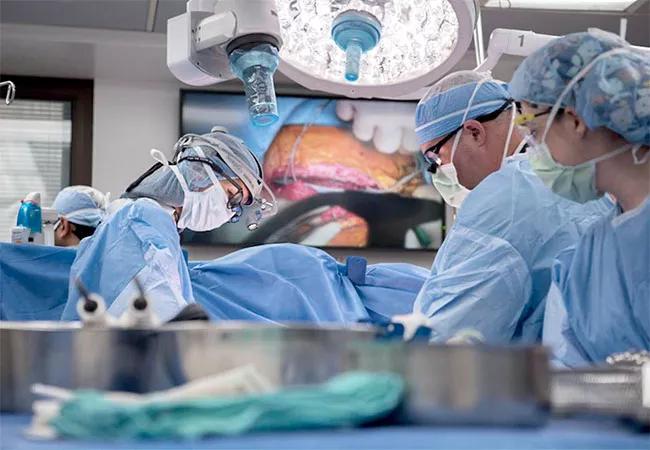Custom STS risk model improves ability to predict 30-day survival for a growing population

A high-performing risk model designed specifically to predict surgical risk in the setting of adult congenital heart disease (ACHD) improves survival prediction for patients with ACHD over existing Society of Thoracic Surgeons (STS) models designed for this population.
Advertisement
Cleveland Clinic is a non-profit academic medical center. Advertising on our site helps support our mission. We do not endorse non-Cleveland Clinic products or services. Policy
Development of the new model, based on data from nearly 200,000 patients with ACHD in the STS Adult Cardiac Surgery Database, was described at the STS annual meeting in January and reported in the Annals of Thoracic Surgery (Epub 20 Jan 2023). The model will eventually be made available as an online risk calculator on the STS website.
“Due to the increased success of treating congenital heart disease in childhood, we are now faced with a rapidly growing population of adult patients who were born with anomalies of the heart and/or great vessels,” says Tara Karamlou, MD, MSc, a pediatric and adult congenital heart surgeon at Cleveland Clinic. “Like the general population, these patients sometimes need surgeries for acquired heart problems, in addition to surgeries they may need for congenital heart problems, but their risks are different. For this reason, the ACHD-specific surgical risk model is a much-needed addition to available STS tools.”
She and Hani Najm, MD, Chair of Pediatric and Congenital Heart Surgery at Cleveland Clinic, are both members of a multicenter group of experts organized by the STS to develop the new model, and they are co-authors of the Annals of Thoracic Surgery paper.
STS has developed a portfolio of pediatric and adult cardiac surgery risk models over the past 30 years. However, risk calculators for the general adult population exclude congenital diagnoses, genetic syndromes and the majority of operations for congenital disease, while models designed specifically for congenital heart disease exclude operations for acquired disease and do not take typical “adult” comorbidity risks into account.
Advertisement
With the longer life expectancy now enjoyed by many patients with ACHD, there is an emerging need for an operative risk model specific to this population.
“Operations for ACHD are often complex, especially as patients get older and acquire new problems,” says Dr. Najm. “Patients with ACHD differ in important ways from the general adult surgical population, for multiple reasons. First are the sequelae from their initial condition. Second are the sequelae from their past surgeries. Finally there are sequelae from acquired diseases of adulthood involving the heart or other organs, such as lungs and liver.”
Despite the heterogeneity of the ACHD population, the multicenter STS group endeavored to create a single comprehensive mortality risk model that could be improved upon by adding specific variables related to congenital diagnosis, adult and congenital preoperative factors, and procedure type.
The cohort used to create the model consisted of 192,196 patients identified with ACHD from the STS Adult Cardiac Surgery Database from 2011 to 2019. Of those, 60% were used for developing the model and 40% for a validation sample.
The model was designed to capture all cardiac procedures in adults with any congenital heart disease diagnosis, including congenital valve disease and connective tissue disorders. The resulting 47 variables that were determined to be relevant were added to the existing STS adult risk model and applied to a single endpoint of operative mortality (defined as death within 30 days of the operation or during hospitalization for the surgery, even if occurring after 30 days).
Advertisement
When evaluated in the validation cohort, the resulting model exhibited excellent discrimination of mortality events versus survival, with a c-statistic of 0.815. This represents a significant improvement over the existing STS adult risk model, which was associated with a c-statistic of 0.791 when applied to ACHD patients (P < 0.0001).
“The model we developed fulfilled our goal of enhancing discrimination of 30-day mortality versus survival in the ACHD population following a cardiac operation,” says Dr. Karamlou, Surgical Director of Cleveland Clinic’s Adult Congenital Heart Disease Center. “Because the model was calibrated within demographic, procedural and diagnosis subgroups, excellent discrimination could be achieved.”
She highlights the following benefits of the new model:
Dr. Najm notes several initiatives that will impact the model in the future:
Advertisement
Race and insurance variables are included in the current risk model, and this made the model stronger, Dr. Najm points out. More precise social risk factors are expected to take their place as they are identified and become available.
“Such social variables are critical in the ACHD population,” says Joanna Ghobrial, MD, MS, Medical and Interventional Director of Cleveland Clinic’s Adult Congenital Heart Disease Center. “Many patients with ACHD may require reinterventions in younger adulthood when they may lack insurance, or during a period when they are transitioning between their parents’ insurance to their own independent insurance.”
In addition, future iterations of the model may include endpoints other than survival, such as major morbidity, failure to rescue and patient-perceived outcomes.
Advertisement
Advertisement

A scannable recap of our latest data in these clinical areas

A scannable graphic recap of our latest data

Innovative hardware and AI algorithms aim to detect cardiovascular decline sooner

Experts advise thorough assessment of right ventricle and reinforcement of tricuspid valve

Reproducible technique uses native recipient tissue, avoiding risks of complex baffles

HALT has unique clinical implications for adults with congenital heart disease

A reliable and reproducible alternative to conventional reimplantation and coronary unroofing

Retrospective study examines outcomes associated with common treatment pathways